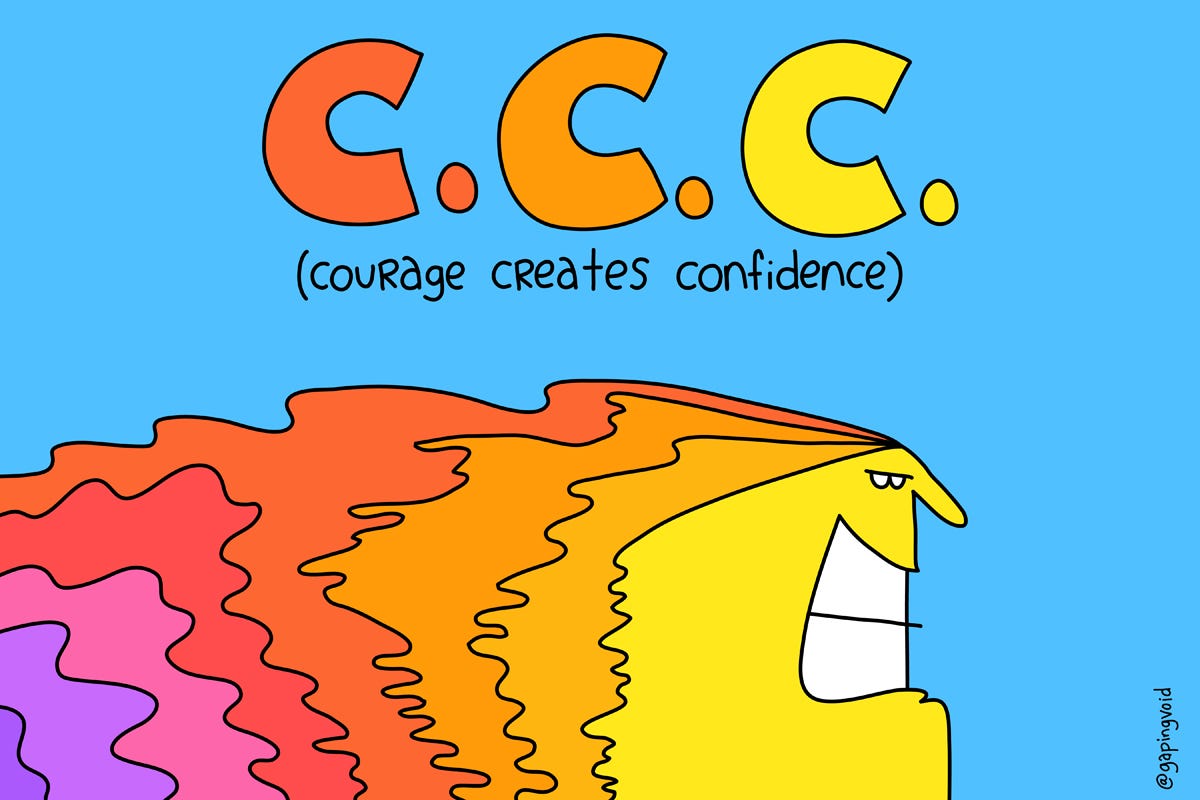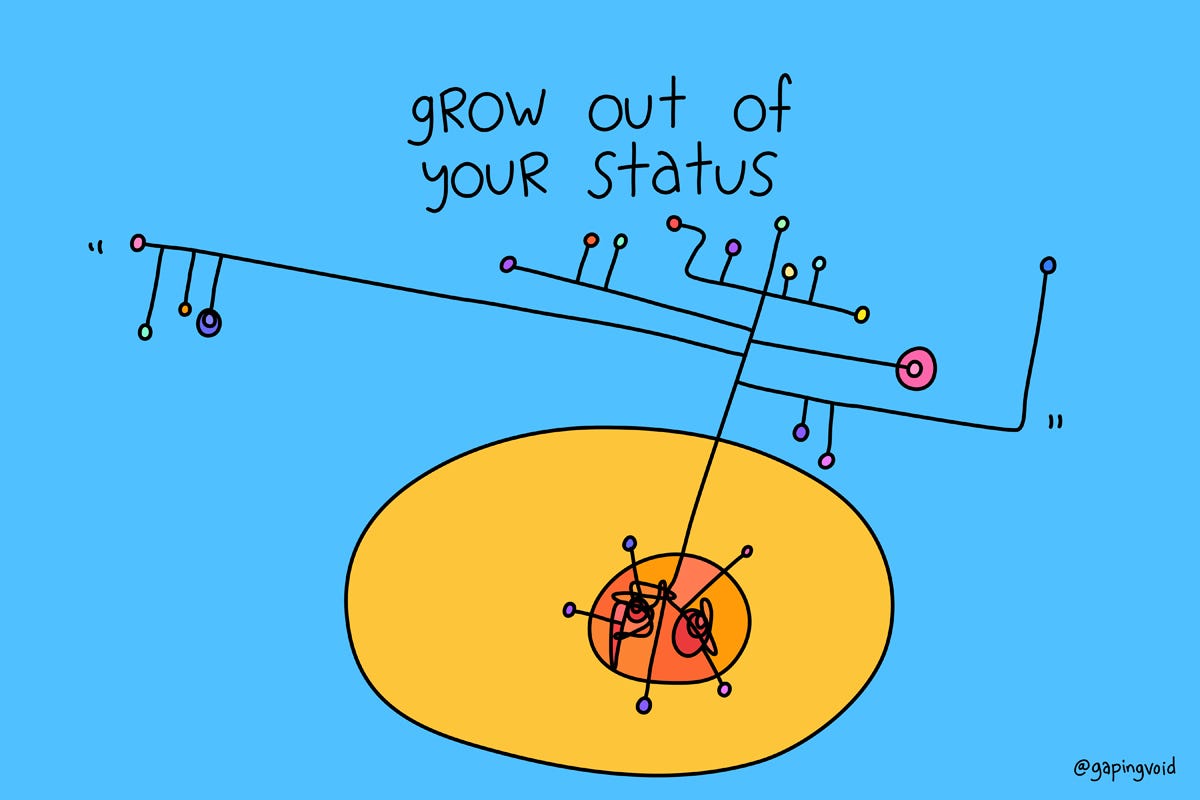During Kobe Bryant’s first year playing basketball at age 11, he scored zero points. He was terrible.
After the last game of the season, he was crying to his dad about how bad he played. His dad looked him in the eyes and said, “I don’t care if you scored 60 points or 0 points. I will love you no matter what.”
That one conversation changed everything for Kobe Bryant. He told Lewis Howes in an interview that when he heard his father say those words, he knew he was “safe.” Regardless of what happened, his father’s love was secure. It was unconditional. He felt protected.
“Okay, that gives me all the confidence in the world to fail. I have that security there,” Kobe said. “But… to hell with that. I’m scoring 60!”
The next season, Kobe started taking way more shots. His creativity blew through the roof. Given that he had full permission to fail, he did just that. He failed over and over and over. Between those failures were lots of successes, and each success built his confidence and creativity.
This article breaks down two keys to Kobe Bryant’s success. Indeed, he did go on to become one of the top-10 players to ever play the game, arguably top-5.
Kobe Had a Stable Foundation to Secure Him While He Pursued a Huge Dream
“Okay, that gives me all the confidence in the world to fail. I have that security there.”
— Kobe Bryant
Not only did Kobe have a supportive family, but he got married young. According to author Ryan Holiday, “The perfect spouse is the best life hack no one told you about.” Being married young, Kobe was different from several of his teammates (Steph Curry is the same way).
Thus, Kobe had a huge amount of relational and emotional support around him. This gave him the internal and external stability to go big on the court. To go huge on his dreams.
When you’re pursuing massive dreams and vision, you’re constantly outside your comfort zone. You’re constantly facing your own internal demons. You’re also facing external obstacles and foes.
Without a solid foundation to keep you centered, it becomes nearly impossible to consistently day-after-day night-after-night face failure and defeat. To put your whole soul on the line. And that’s what Kobe did. He put his soul on the line every single day.
As a young boy, his skill developed rapidly because he was so willing to put himself out there. So willing to try. He did note that at a young age, he became committed to the “long-game.” It takes confidence to commit to huge goals. It takes faith in your future self. He had that faith because he had a sure foundation as a human being to support him.

Kobe Had a “Short Memory,” Which Made Him Emotionally Bulletproof
I always wanted to be better, wanted more. I can’t really explain it, other than that I loved the game but had a very short memory. That fueled me until the day I hung up my sneakers.
— Kobe Bryant
In psychology, a refractory period is the amount of time it takes to emotionally recover and move on from an experience. Small frustrations, such as getting cut off on the road or getting in an argument with your spouse, may take a few minutes or hours to recover from. Some events, though, may take months, years, or even decades to let go of. Indeed, some events are never outgrown.
Becoming psychologically flexible enables you to shorten the length of refractory periods — even when really painful or difficult experiences happen. You become psychologically flexible by being in touch with your emotions but not completely absorbed by them. You hold your thoughts and emotions loosely as you actively pursue meaningful goals.
In professional basketball, a player doesn’t have time to get upset and discouraged if they miss a shot. They may be disappointed or embarrassed when they miss, but ultimately, they need to get back in the game and stay both attentive to the moment and committed to the goal of helping their team win, regardless of how they are feeling.
If they linger in the emotion of the missed shot, they won’t be able to operate fully on the court, which creates more problems for themselves and their team. If they emotionally attach to what happened, they may avoid taking the shot next time out of fear or negative expectation. They’re stuck in the past rather than acting as their future self.
The less you hold on to mistakes or painful experiences, the better you’re able to adapt to what the situation requires and perform in order to achieve your goals. What happened in the past doesn’t impact the next thing you do, or stop you from being entirely present at this moment.
The more psychologically flexible you are, the faster you can let things go. The less psychologically flexible you are, the longer you hold on to even small things.
When a person remains stuck in an emotional refractory period following a difficult experience, they continue seeing and experiencing life from their initial reaction to the experience. Therefore, day after day, they continue to reconstruct the emotions of the experience. They don’t regulate and reframe how they see and feel about the event.
As the author, Dr. Joe Dispenza states:
If you keep that refractory period going for weeks and months, you’ve developed a temperament. If you keep that same refractory period going on for years, it’s called a personality trait. When we begin to develop personality traits based on our emotions, we’re living in the past, and that’s where we get stuck. Teaching ourselves and our children to shorten the refractory period frees us to move through life without obstruction.
The key is having a “short memory.” To let things go fast, both success and failure. There is a powerful statement for this: “Expect everything and attach to nothing.”
Conclusion: Expect Everything and Attach to Nothing
“Expect everything, attach to nothing.”
— Carrie Campbell

The worst advice in the world is to lower your expectations. There is nothing motivating, hopeful, engaging, or exciting about lowering your expectations. I guarantee you that Kobe expected every shot he made to go in. However, the key for Kobe was that he didn’t attach to the outcome of that particular shot. Whether he made or missed, he was going to shoot again. He put it behind him.
When you expect everything and attach to nothing, that means you don’t get caught up in the process. You’re fully committed to the end result. But you don’t get caught up in the process of getting there. You know you’ll make and miss all along the way.
Expect everything, attach to nothing. Remain committed to the ultimate goal. Keep your eyes forward. Don’t get lost in the process. Be flexible in the process.
Mind Cafe in Your Inbox
Liked this story? To keep up to date with others, sign up for email updates by following this link and clicking subscribe.








